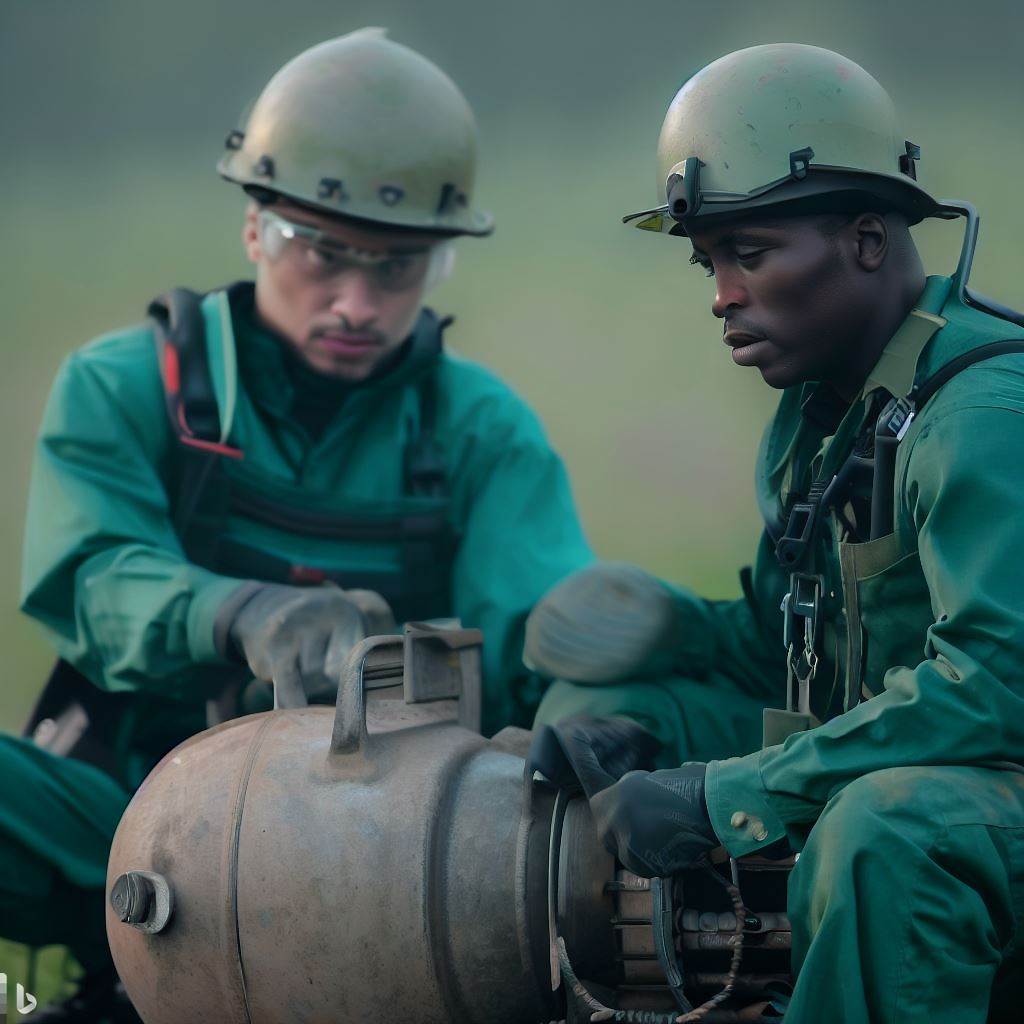Introduction
Bomb technicians play a crucial role in Nigeria by handling explosive devices safely and effectively.
Legal requirements are paramount to ensure the professionalism and adherence to safety protocols of bomb technicians.
Background on Bomb Technicians in Nigeria
The Nature of Bomb Threats and Explosive Devices in Nigeria
- Bomb threats and explosive devices are serious security concerns in Nigeria.
- These threats pose a significant risk to public safety and national security.
- Various terrorist groups in Nigeria have employed bombs as weapons of choice.
- Improvised explosive devices (IEDs) are commonly used by these groups.
- IEDs are homemade bombs created with readily available materials.
- They are designed to cause maximum damage and casualties.
- The sizes and types of explosive devices used vary, ranging from small to large-scale bombs.
- Bomb threats and attacks have targeted various locations, including government facilities, public transportation, and religious institutions.
- The frequency and severity of bomb threats in Nigeria have necessitated the establishment of specialized bomb technician units.
- Bomb technicians play a critical role in mitigating the risks associated with explosive devices.
Overview of the Responsibilities and Dangers Bomb Technicians Face
- Bomb technicians are highly trained professionals responsible for handling and disposing of explosive devices.
- Their primary objective is to neutralize and safely remove any potential threats.
- Bomb technicians work closely with law enforcement agencies and military units.
- They conduct thorough investigations and assessments of bomb threats and explosive devices.
- These professionals must possess extensive knowledge of bomb components and manufacturing techniques.
- They utilize specialized tools, equipment, and protective gear during their operations.
- Bomb technicians carefully analyze and assess the situation before taking any necessary actions.
- They employ various techniques, such as X-ray and robotic devices, to inspect and disable explosive devices.
- The job of a bomb technician is inherently risky, as they work in potentially life-threatening situations.
- The dangers they face include accidental detonations, booby traps, and exposure to hazardous materials.
- Bomb technicians must remain calm and composed under pressure while ensuring the safety of themselves and others.
- Continuous training, skill development, and updates on new threats are crucial for bomb technicians.
- Their role is highly demanding and requires a strong sense of duty, attention to detail, and adherence to strict protocols.
- Bomb technicians often work irregular hours and must be available to respond to emergencies at any time.
In fact, bomb technicians in Nigeria play a vital role in countering bomb threats and ensuring public safety. They face significant risks and dangers while carrying out their responsibilities.
Adequate training, equipment, and support from the government are essential to enable these professionals to effectively prevent and respond to bomb incidents.
Read: Women in Bomb Disposal: Breaking Barriers in Nigeria
Legal requirements for becoming a bomb technician in Nigeria
Education and training requirements
- Completion of relevant academic programs or courses
- On-the-job training and apprenticeship
Certification and licensure
- Obtaining specific certifications related to explosives handling
- Licensing processes and requirements
Background checks and security clearance
- Detailed character and background investigations
- Necessary security clearances and checks from government agencies
Read: Bomb Disposal Equipment: Tools Used in Nigeria
Essential skills and competencies
Bomb technicians in Nigeria require a range of essential skills and competencies to effectively perform their duties and ensure public safety.
Dividing these skills into three categories: expertise in explosives, problem-solving, and physical fitness, all demand an active approach.
Technical expertise in handling explosives
One of the primary requirements for bomb technicians is their technical expertise in handling explosives.
This includes a comprehensive understanding of explosive materials and devices commonly used in improvised explosives.
It is essential for bomb technicians to be familiar with different types of explosives, their characteristics, and their potential threats.
In addition to knowledge about explosive materials, bomb technicians must also have proficiency in bomb disposal techniques.
They should be trained in the latest methods and procedures to safely neutralize explosive devices. This includes proper handling, transportation, and disposal of explosives to minimize the risks involved.
Analytical and problem-solving skills
Bomb technicians must possess strong analytical and problem-solving skills to effectively assess and evaluate potential threats.
They need to quickly analyze the situation, gather relevant information, and make accurate assessments of the potential risks involved.
This requires a keen eye for detail and the ability to think critically under high-pressure situations.
In addition, bomb technicians must have effective decision-making skills. They often find themselves in life-threatening situations where quick and accurate decision-making is crucial.
The ability to make sound judgments and take decisive action is essential for ensuring the safety of themselves and others.
Physical fitness and endurance
Physical fitness and endurance are vital for bomb technicians as they often engage in physically demanding tasks.
They need to maintain optimal fitness levels to handle the arduous nature of their work.
This includes regular exercise, strength training, and maintaining a healthy lifestyle to ensure they have the physical capacity to perform their duties effectively.
Bomb technicians may also encounter situations that require long hours of work and physically demanding activities.
They must be able to endure these situations without compromising their focus or physical capabilities.
This includes the ability to work for extended periods without rest, often in challenging and hazardous environments.
In essence, bomb technicians in Nigeria require a diverse set of skills and competencies to effectively carry out their duties.
These include technical expertise in handling explosives, analytical and problem-solving skills, and physical fitness and endurance.
By possessing these essential skills, bomb technicians can ensure public safety and effectively neutralize potential threats.
Read: Safety Protocols in Nigerian Bomb Disposal Operations
Challenges faced by bomb technicians in Nigeria
As bomb technicians carry out their crucial work in Nigeria, they face numerous challenges that hinder efficient operations and compromise their well-being.
In this section, we will explore two significant challenges faced by these brave individuals: lack of resources and funding, and the psychological impact and stress they encounter.
Lack of resources and funding
The nature of bomb disposal work demands specialized equipment and protective gear to ensure the safety of technicians.
However, a major challenge faced by bomb technicians in Nigeria is the insufficient provision of such resources.
Professionals face elevated risks and greater chances of accidents and injuries when lacking proper equipment.
Additionally, there is a limited budget allocation for training and support for bomb technicians. The intricate nature of their work necessitates continuous training to stay updated with evolving tactics and technologies.
However, the lack of financial resources allocated to training programs hampers the professional development of these technicians, preventing them from gaining essential skills and knowledge needed to effectively carry out their duties.
Psychological impact and stress
Bomb technicians operate in high-stress environments, constantly dealing with life-threatening situations. The pressure of uncovering and neutralizing explosive devices takes a toll on their mental well-being.
The fear of making a mistake or encountering unforeseen circumstances can lead to heightened levels of stress, anxiety, and even post-traumatic stress disorder (PTSD).
To mitigate the psychological impact of their work, bomb technicians require proper coping mechanisms and mental health support.
Unfortunately, such provisions are often lacking in Nigeria. The emotional burden they carry is immense, and without access to adequate support systems, their mental health may deteriorate over time, potentially affecting their job performance and overall well-being.
In review, bomb technicians in Nigeria face significant challenges that hinder their ability to carry out their crucial work effectively and safely.
The lack of resources, including insufficient equipment and limited budget allocation for training, compromise their safety and professional development.
Moreover, the psychological impact and stress they experience due to the nature of their work require proper coping mechanisms and mental health support.
Addressing these challenges is essential to ensure the well-being of bomb technicians and enhance their effectiveness in safeguarding the Nigerian population from the threat of explosive devices.
Read: Bomb Disposal Pay and Benefits in Nigeria: A Study

Compliance with international standards and best practices
Comparison with global standards for bomb technicians
- Nigeria’s legal requirements for bomb technicians are assessed against global standards.
- International best practices serve as a benchmark to evaluate the adequacy of Nigerian regulations.
- It is crucial to ensure that Nigerian bomb technicians meet or exceed global standards.
- Regular reviews and updates are conducted to bridge any gaps with international requirements.
- Comparison with global standards helps identify areas of improvement for Nigerian bomb technician regulations.
Efforts to align Nigerian regulations with international requirements
- Nigeria is committed to aligning its bomb technician regulations with international requirements.
- Efforts are made to ensure that Nigerian laws and regulations are in line with global standards.
- Close collaboration with international organizations helps identify areas for regulatory alignment.
- Regular updates are made to Nigerian regulations based on international best practices.
- Alignment with international requirements enhances the professionalism and effectiveness of Nigerian bomb technicians.
Collaboration with international agencies and training programs
- Nigeria actively collaborates with international agencies to enhance bomb technician training and practices.
- Partnerships with international organizations facilitate knowledge sharing and capacity building.
- Training programs are developed in collaboration with international experts in bomb disposal.
- Technical assistance and support from international agencies strengthen Nigeria’s bomb disposal capabilities.
- Collaboration with international agencies ensures Nigerian bomb technicians are equipped with the latest techniques and tools.
Impact of Legal Requirements on Bomb Detection and Disposal Operations in Nigeria
Enhancements in operational efficiency and effectiveness
- Legal requirements facilitate the establishment of standardized procedures for bomb detection and disposal operations.
- These procedures ensure that bomb technicians follow a systematic approach, increasing operational efficiency.
- By adhering to legal requirements, bomb technicians can effectively deploy their skills and resources to mitigate threats.
- The use of protocols mandated by law allows for consistent and reliable execution of bomb disposal operations.
- Standardized training and certification processes required by law enable bomb technicians to enhance their expertise.
Decrease in accidents and fatalities related to explosive incidents
- Compliance with legal requirements ensures that bomb technicians prioritize safety during detection and disposal operations.
- By following established protocols, bomb technicians minimize the risks associated with handling explosives.
- Legal requirements also demand the use of specialized equipment and protective gear, further reducing the likelihood of accidents.
- Proper record-keeping, as mandated by law, allows for analysis and improvement of bomb disposal practices.
- Through continuous evaluation and adherence to legal standards, the occurrence of accidents and fatalities can be significantly reduced.
Increased public confidence in bomb disposal capabilities
- Legal requirements create transparency in bomb detection and disposal operations, instilling trust in the public.
- Clear regulations help to establish the competence and professionalism of bomb technicians.
- When the public perceives bomb technicians as highly trained professionals bound by legal obligations, confidence grows.
- Strict adherence to legal requirements demonstrates a commitment to public safety and fosters trust in bomb disposal capabilities.
- Public awareness of legal standards also promotes collaboration and cooperation between bomb technicians and the community.
In a nutshell, the impact of legal requirements on bomb detection and disposal operations in Nigeria is profound.
Compliance with these requirements not only enhances operational efficiency and effectiveness but also leads to a decrease in accidents and fatalities related to explosive incidents.
Strictly following legal requirements increases the public’s confidence in bomb disposal capabilities.
It is crucial for bomb technicians to understand and adhere to these legal obligations to ensure the safety and security of the Nigerian population.
Conclusion
Recap of the legal requirements for bomb technicians in Nigeria
It is essential that bomb technicians in Nigeria understand and adhere to the specific legal requirements governing their profession.
These include obtaining proper certification, licenses, and permits from relevant authorities.
Bomb technicians must also comply with regulations regarding the handling, transportation, and disposal of explosives.
They must follow strict safety protocols, including wearing protective gear and utilizing specialized equipment.
Bomb technicians must regularly train and recertify, staying current with the latest bomb detection and disposal techniques and advancements.
Importance of adhering to these regulations for the safety of the public and bomb technicians themselves
The legal requirements for bomb technicians in Nigeria are in place to safeguard both the general public and the bomb technicians themselves.
By strictly adhering to these regulations, bomb technicians minimize the risk of accidents, explosions, and potential harm to innocent lives.
They ensure that their work is carried out in a controlled and secure environment.
Legal requirements hold professionals accountable, maintaining quality by permitting only competent experts to handle explosives.
The legal requirements for bomb technicians in Nigeria play a vital role in maintaining public safety and the professionalism of the industry.
Adhering to these regulations is of utmost importance for the well-being of the public and the success of bomb disposal operations.




